#essay writing
Text
It seems like one of the biggest and most common mental hangups I find in almost everyone is a failure to adapt to superseding concepts.
That's to say, sometimes, earlier on in life or in understanding of something, you will be told a simplified version of the truth, often a black and white silhouette of an idea. However, the more you learn, the more you're meant to find the shades, the blurriness, the nuances of everything. It seems like many people don't understand this, or more accurately, are never rewarded for doing this.
The issue seems to be that on a rhetorical level, the most easily transmissible ideas are those black and white statements, the ones that punch the best. Most people don't attempt to engage in concepts on a deeper level out of their own interest, so if all they are surrounded by is surface level statements, their understanding of the world will never advance beyond a surface level.
This is what happens with bigots when they are confronted with actually interacting with the people they choose to hate on a more personal level. To even speak to someone is to treat them in some way as a person, and so, while they almost never budge on anything that doesn't directly affect their life even after these sorts of learning experiences, they are forced to add shade on something they desperately want to be black and white. Obviously, many people's delusions win out even with direct contact, but still.
This also most certainly affects leftist spaces. It feels like there are two different kinds of leftist spaces, ones where the solution to differences is to put up harsh walls and outlines between everything and police those rules strictly, and the other where the solution is to let them intermix and talk it out. It's sadly difficult to simply cast away that first one, the silhouette, when it comes to politics, because even progressive groups need to consolidate together to push on a rhetorical level for cultural acceptance and systematic changes, but the internals cannot reflect this idea, because it simply isn't how anything should work. It's a defensive reaction to difference, drawing lines around yourself so everything makes clear and simple sense.
Absolutism is a philosophy for children, but that doesn't mean it's bad. It just means that we're meant to graduate from that eventually. Allow yourself to see the grey, and you might find that there's a beauty to the shading.
#advice#essay#essay writing#mini rant#rant post#rant#personal rant#politics#sociology#learning#special interest#writing#mini essay#rhetoric
29 notes
·
View notes
Text
Random writing tips that my history professor just told during class that are actually helpful
Download all your sources or print them so you can turn off your wifi
Give your phone to someone
Just. WRITE. Writing is analysing, you’ll get more ideas as you write. It doesn’t need to be perfect, for now you can just blurt out words and ideas randomly. You can fix it later.
Create a skeleton/structure before writing.
Stop before you get exhausted. It’s best to stop writing when you still have some energy and inspiration left, this will also motivate you to get started again next time.
Make a to do list
Work in bite sizes. Even if it’s not much, as long as you put some ideas on paper or do some editing.
Simple language =/= boring language, simple language = clear language.
Own your words. If they are not your words, state this clearly in the text, not just in the footnotes.
STOP BEFORE YOU GET EXHAUSTED. Listing it again because it’s easily one of the best tips a teacher has ever given me.
#ive been studying for 4 years and rarely has a teacher actually given productivity tips#thank you Lies.#history student#history studyblr#essay writing#writing tips#history tips#paper writing#study blog#studyblr#adhd#neurospicy#university#college#study with adhd#study motivation#academia#studyspo#please normalise teaching students how to be productive#make studying accessible#accessibility
13K notes
·
View notes
Text


essay writing with a view <3
#studyblr#studying#study motivation#student#study aesthetic#study abroad#light academia#romantic academia#aesthetic#dark acadamia aesthetic#dark academia vibes#grey academia#cityscape#sydney#sydney australia#studying abroad#essay writing#english literature
672 notes
·
View notes
Text
How to Nail your School Essays
Not to brag, but I’m kind of a big deal when it comes to essays at my school. Since I started highschool I haven’t received a grade less than 90% on an essay—so I’m here to share my secret. This works for the classic essay, but you can also use the same advice and fit it to formal reports or other academic writing.
1. Your essay is about 2 things, demonstrated 3 or more times
This is how I’ve always thought about essays. They’re about two ideas, demonstrated as many times as you need to fill the wordcount. Shakespeare + Feminism, Media + Truth versus Misconception, etc. etc. If you’re lucky, your teacher or prof will give you one of your elements. You’ll get assignments like, “write an essay about Hamlet” or “write an essay about the American dream” lucky you, that’s your first thing—now you need to connect it with another.
This connecting idea is my favourite part because you just get to choose a concept or idea you’re interested in. Here’s a tip, if your first/given topic is something concrete, choose an abstract connecting idea. If your given topic is something abstract, choose a concrete.
So, Hamlet (concrete) could be paired with any abstract concept: Loyalty, Truth, Feminism, etc.
However, if your prof gives you something like, “truth” or “race theory”, you’ll find it much easier to connect that with a more concrete thing, like a book, movie, or other piece of media, or even a specific person.
If you are luckiest, your prof will give you both things, “write about the American Dream in The Great Gatsby” in this case, you’re onto the next stage.
2. Stick to the formula
Tried, tested, true. Nothing wrong with a formula, especially not when it gives you A+ grades. Typical essay structure is:
Intro with thesis
2. 1st Body
2a. Evidence that proves it 1
2i. Justify its relevance
2b. Evidence that proves it 2
2ii. Justify its relevance
Etc.
3. 2nd Body
3a. Evidence that proves it
3i.Justification
Etc.
4. 3rd Body
4a. Rise and repeat, you know where this is going.
5. Some may argue…
6. Conclusion
Let’s break it down.
Thesis:
Thesis completely outlines all your points, or the three+ places you’re demonstrating your connection, and why it matters.
Here is an intro + thesis I wrote a couple years ago:
“This literature review will explore the impacts influencer marketing has on the children that regularly consume social media content. Specifically, this review will focus on how influencers can impact children’s brand preferences, dietary choices, and lastly, the influx of children taking advantage of this system and becoming influencers themselves.”
Or
“Burned discusses the human aspect of sex work and reverses reader’s expectations on sex workers, while Not in My Neighbourhood discusses prostitutes as victims of a system created against them. Both challenge readers’ perceptions of sex workers, effectively drawing attention to the ethics of displacing sex workers from their cities.”
So you have your connection (children and social media)/(Burned and Not in My Neighbourhood and sex work), and the different ways you plan on exploring or proving that idea (children’s brand preferences, dietary choices, children becoming influencers.) etc.
You may also have a more specific stance in your thesis. Such as, “In Macbeth, ambition is shown to be Macbeth’s ultimate downfall in these three ways.”
The Body Paragraphs
You start out every body paragraph with the point of the paragraph, or what it’s aiming to prove. Such as, “Influencers often include advertisements within their content, which can encourage children to feel more amiably to certain brands their favourite content creators endorse frequently more than others.”
After this claim, you spend the rest of the paragraph further proving it through examples. This will look like citing a specific source (a book, academic journal, quote, etc.) such as, “The authors claim likeable influencers can associate their likeability with the products they use, influencing children’s perception of brands, referred to as ‘meaning transfer’ (De Veirman et al. 2019)” (super important to always cite these sources!)
The last part is after each example/proof--you need to justify why this proves your point/is important. So, “This proves children are more influenced towards certain products depending on how close of a relationship they perceive to have with the influencer.”
Typically, your evidence will all lead into each other so you can transition to the next piece of proof, then the justification, rinse and repeat until you’re finished your paragraph. You can have as many pieces of evidence as you want per paragraph, and the longer your word requirement, the more you’ll want to fit into each point (or the more bodies you want to have.)
Piece of evidence + why it matters, rinse and repeat.
Some May Argue:
This is a small paragraph just before your conclusion where you anticipate an argument your readers may have, and disprove it. So, for example, you’d start with, “Some may argue that with parent supervision, the impacts of influencers on children could be lessened or moot. However…” and then explain why they’re wrong. This strengthens your argument, and proves that you’ve really thought out your stance.
Conclusion:
Lastly, you want to sum up all the conclusions you came to in a few sentences. Your last line is one of the most important (in my opinion). I call it the mic drop moment. Leaving a lasting impact on your reader can bring your essay from an A to an A+, so you really want to nail this final sentence.
My final sentence was, “Ultimately, it is hard to know in advance how technology and social media will impact the development of children who have always grown up with some form of screen, but until they grow up, parents and caregivers need to take care in the content their children consume, and their very possible exploitation online.”
This sentence is backed by the entirety of the essay that came before it, and usually leaves a little something to chew on for the readers.
Any other tips I missed?
#writing#creative writing#writers#screenwriting#writing community#writing inspiration#filmmaking#film#books#writing advice#how to nail your school essays#essay writing#academic writing
785 notes
·
View notes
Text
PSA to anyone writing an essay at ANY level:
please, for the love of god, integrate your quotes properly. don't just drop them in the middle of nowhere D:
it's very easy:
Step 1: Introduce the Author of the Quotation (Who/where is it from)
Step 2: State the Quotation (the quote)
Step 3: Summarize the Quotation (paraphrase it)
Step 4: Analyze the Quotation (Break down the meaning)
Step 5: State the Quotation’s Relevance to Your Argument (Why did you just share this quote how is it related to your essay?)

Here's another example:
After talking with Cherry, a girl from the opposing group, Ponyboy, the main character in The Outsiders, by S.E Hinton, observes, "Maybe the two different worlds we lived in weren't so different. We saw the same sunset" (Hinton, 78). In other words, after talking, they realized they had more things in common than they thought. This shows that one of the reasons the two groups keep fighting is that they don't really ever communicate with each other. This is a reflection of our society today, where people discriminate against each other based on stereotypes, without actually ever communicating with each other.
Its an easy formula to follow and literally makes your writing sound so much clearer PLEASE just DO it and SAVE THE EYES of your teachers today
- sincerely a teacher who is TIRED OF SEEING quotes that have been parachuted into a sentence and no one knows who said it or why you added it in your paper PLEASE we want to give you good grades help us out 😭😭😭
762 notes
·
View notes
Text
I don’t usually talk about politics on here, if ever. But it’s been almost six months since the conflict in the Middle East flared up again, and I’m finally ready to start. Here are some of my thoughts.
I say ‘flared up’ because this has happened before and it’ll happen again. Because, even though what's currently going on is absolutely unprecedented, those of us who live in this part of the world are used to it. Let that sink in: we are used to this. And we shouldn’t have to be.
But I use that term for another reason: I don't want to accidentally call it the wrong thing lest I come under fire for being a genocidal maniac or a terrorist or a propaganda machine, etc., etc.—so let’s just call it ‘the war’ or ‘the conflict.’ Because that’s what it is. Doesn’t matter which side you’re on, who you love, or who you hate.
This post will, in all likelihood, sit in my drafts forever. If it does get posted, it certainly won’t be on my main, because I'm scared of being harassed (spoiler: she posted it on her main). I hate admitting that, but honestly? I’m fucking terrified.
I also feel like in order for anything I say on here (i.e. the hellscape of the internet) to be taken seriously, I have to somehow prove that a) I’m “educated” enough to talk about the conflict, and b) that my opinion lines up with what has been deemed the correct one. So, tedious and unnecessary though it is, I will tell you about my experience, because I have a feeling most of the people reading this post are not nearly as close to what’s happening as I am.
How do I explain where I live without actually explaining where I live? How do I say “I live in the Red Zone of international conflicts” without saying what I actually think? How do I convey the fear that grips me when I try to decide between saying “I live in Palestine” and “I live in Israel”? I don't really know. But I do know that names are important. I also know that, due to the various clickbaity monikers ascribed to the conflict, it would probably just be easier to point to a map.
I haven't always lived in the Middle East. I've lived in various places along America’s east coast, and traveled all over the world. But in short, I now live somewhere inside the crudely-drawn purple circle.
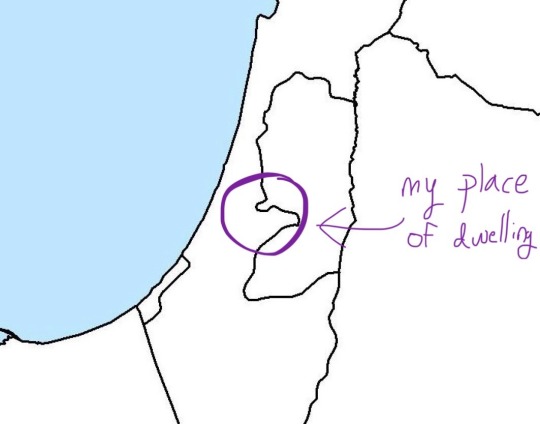
If you know anything about these borders you probably blanched a bit in sympathy, or maybe condolence. But in truth, it’s a shockingly normal existence. I don't feel like I've lived through the shifting of international relations or a war or anything. I just kind of feel like I did when COVID hit, that dull sameness as I wondered if this would be the only world-altering event to shape my life, or if there would be more.
I've been told that, in order for my brain to process all the horrific details of the past six months, there needs to be some element of cognitive dissonance—that falling into a sort of dissociative mindset is the only way to not go insane under the weight of it all. I think in some ways that’s true. I have been terrifyingly close to bus stop shootings when my commute wasn’t over; I have felt my apartment building shake with the reverberations of a missile strike; I have spent hours in underground shelters waiting for air raid sirens to stop.
But. I have also gone grocery shopping, and skipped class, and stayed up too late watching TV, and fed the cats on the street corner, and cried over a boy, and got myself AirPods just because, and taken out the trash, and done laundry on a delicate cycle, and bought overpriced lattes one too many days a week. I have looked at pretty things and taken out my phone because, despite it all, I still think that life is too short not to freeze the small moments.






So I'd say, all things considered, I live an incredibly privileged life—compared, of course, to those suffering in Gaza—one filled with sunsets and over-sweetened knafeh and every different color of sand. One that allows me to throw myself into a fandom-induced hyperfixation (or, alternatively, escape method) as I sit on the couch and crack open my laptop to write the next chapter of the fic I'm working on.
But there are bits of not-normalness that wheedle their way through the cracks. I pretend these moments are avoidable, even if they’re not.
They look like this: reading the news and seeing another idiotic, careless choice on Netanyahu’s part and groaning into my morning coffee. Watching Palestinian and Jewish children’s needless suffering posted on Instagram reels and feeling helpless. Opening my Tumblr DMs to find a message telling me to exterminate myself for reblogging a post that only seems like it’s about the war if you squint and tilt your head sideways.
These moments look like all the tiny ways I am reminded that I'm living in a post-October seventh world, where hearing a car backfire makes me jump out of my skin and the sound of a suitcase on pavement makes me look up at the sky and search for the war planes. They look like the heavy grief that is, and also isn’t, mine.
Here's the thing, though. I know you’re wondering when the ball will drop and my true opinion will be revealed. I know you’re waiting for me to reveal what demographic I'm a part of so that you, dear reader, can neatly slap a label on my head and sort me into some oversimplified category that lets you continue to think you understand this war.
No one wants to sit and ruminate on the difficult questions, the ones that make you wonder if maybe you’ve been tinkered with by the propaganda machine, if you might need to go back on what you’ve said or change your mind. We all strive for our perception of complicated issues to be a comfortable one.
But I know that no matter what I do, there will always be assumptions. So, while I shudder to reveal this information online, I think that maybe my most significant contribution to this meta-discussion spanning every facet of the internet is this:
I am a Jew.
Or, alternatively, I am: Jewish, יהודית, يَهُودِيٌّ, etc. Point is, I come from Jews. And, like any given person, I am a product of generation after generation of love.
I'm not going to take time to explain my heritage to you, or to prove that before all the expulsions and pogroms, there was an origin point. If you don’t believe that, perhaps it’s less of a factual problem and more of an ‘I don’t give weight to the beliefs of indigenous people’ problem. But, in case you want to spend time uselessly refuting this tiny point in a larger argument, you can inspect the photos below (it’s just a small chunk of my DNA test results). Alternatively, you can remember that interrogating someone in an attempt to make their indigeneity match your arbitrary criteria is generally not seen as good manners.
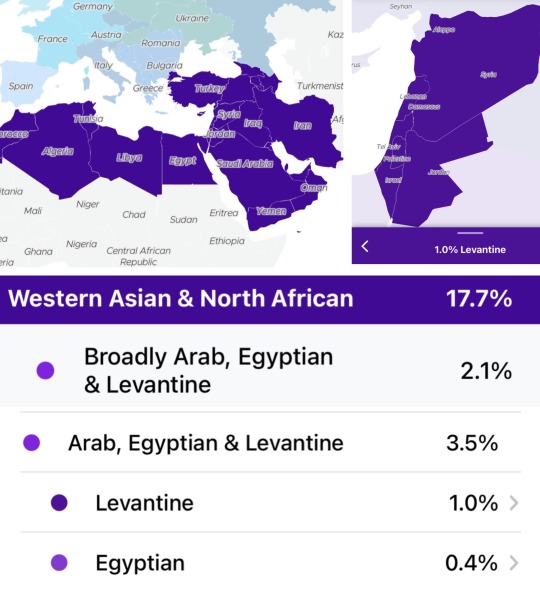
Now, let’s go back to thathateful message (read: poorly disguised death threat) I received in my Tumblr DMs. I think it was like two or three weeks ago. I had recently gained a new follower whose blog’s primary focus was the fandom I contribute to, so I followed them back. I saw in my notes that they were going through my posts and liking them—as one does when gaining a new mutual. Yippee!
Then they sent me this:
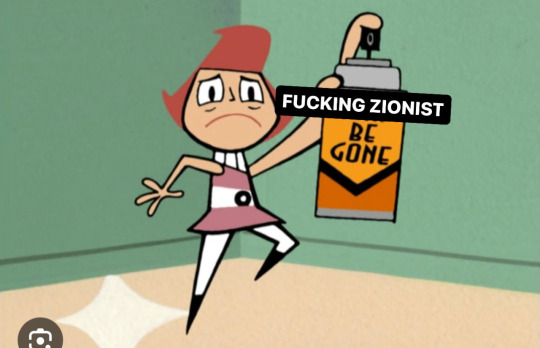
I tried to explain that hate speech is not a way to go about participating in political discourse, but the person had already blocked me immediately after sending that message. Then, assured by the fact that I surely would never see them complaining about me on their blog (because, as I said, they blocked me), they posted a shouting rant accusing me of sympathizing with colonizing settlers and declaring me a “racist Zionist fuck.” Oh, the wonders of incognito tabs.
Where this person drew these conclusions after reading my (reblogged) post about antisemitism…. I'm not actually sure. But I greatly sympathize with them, and hope that they weren’t too personally offended by my desire to not die.
For a while I contemplated this experience in my righteous anger, and tried to figure out a way to message this person. I wanted to explain that a) seeing a post about being Jewish and choosing to harass the creator about Israel is literally the definition of antisemitism and b) that sending a hateful DM and refusing to be held accountable is just childish and immature. But I gave up soon after—because, honestly, I knew it wasn’t worth my effort or energy. And I knew that I wouldn't be able to change their mind.
But I still remember staring at that rather unfortunate meme, accompanied by an all-caps message demanding for me to Free Palestine, and thinking: the post didn’t even have any buzzwords. I remember the swoop of dread and guilt and fear. I remember wondering why this kind of antisemitism felt worse, in that moment, than the kind that leaves bodies in its wake.
I remember thinking, I don’t have the power to free anyone.
I remember thinking, I’m so fucking tired.
And before you tell me that this conflict isn’t about religion—let me ask you some questions. Why is it that Israel is even called Israel? (Here’s why.) Why do Jews even want it? (Here’s why.) But also, if you actually read the charters of Islamist terrorist organizations like ISIS, Hamas, and Hezbollah (among others), they equate the modern state of Israel with the Jewish people, and they use the two entities interchangeably. So of course this conflict is religious. It’s never been anything but that.
But I do wonder, when faced with those who deny this fact: how do I prove, through an endless slew of what-about-isms and victim blaming, that I too am hurting? How do I show that empathy is dialectical, that I can care deeply for Palestinians and Gazans while also grieving my own people?
There's this thing that humans do, when we’re frustrated about politics and need to howl our opinions about it into the void until we feel better. We find like-minded souls, usually our friends and neighbors, and fret about the state of the world to each other until we’ve gone around in a satisfactory amount of circles. But these conversations never truly accomplish anything. They’re just a substitute, a stand-in catharsis, for what we really wish we could do: find someone who embodies the spirit of every Jew-hating internet troll, every ignorant justifier of terrorism, and scream ourselves hoarse at them until we change their mind.
But, of course, minds cannot be changed when they are determined to live in a state of irrational dislike. In Judaism, this way of thinking has a name: שנאת חינם (sinat hinam), or baseless hatred. It's a parasite with no definite cure, and it makes people bend over backwards to justify things like the massacre on October seventh, simply because the blame always needs to be placed on the Jews.
So when a Jew is faced with this unsolvable problem, there is only one response to be had, only one feeling to be felt: anger. And we are angry. Carrying around rage with nowhere to put it is exhausting. It's like a weight at the base of our neck that pushes down on our spine, bending it until we will inevitably snap under the pressure. I’m still waiting to break, even now.
I wish I could explain to someone who needs to hear it that terrorism against Israelis happens every single day here, and that we are never more than one degree of separation away from the brutal slaughter of a friend, lover, parent, sibling. I wish it would be enough to say that the majority of Israelis (which includes Arab-Israeli citizens who have the exact same rights as Jewish-Israelis) wish for peace every day without ever having seen what it looks like.
I wish I could show the world that Israel was founded as a socialist state, that it was built on communal values and born from a cluster of kibbutzim (small farming communities based on collective responsibility), and that what it is now isn’t what its people stand for.
I wish the world could open their eyes to what we Israelis have seen since the beginning: that Hamas is the enemy, Hamas is the one starving Palestinians and denying them aid, Hamas is the one who keeps rejecting ceasefire terms and denying their citizens basic human rights. Hamas is the governing body of Gaza, not Israel. Hamas is responsible for the wellbeing of the Palestinian people. And Hamas are the ones who are more determined to murder Jews—over and over and over again, in the most animalistic ways possible—than to look inwards and see the suffering they’ve inflicted on their own people. I wish it was easier to see that.
But the wishing, the asking how can people be so blind, is never enough. I can never just say, I promise I don't want war.
When I bear witness to this baseless hatred, I think of the victims of October seventh. I think of the women and girls who were raped and then murdered, forever unable to tell their stories. I think of the hostages, trapped underneath Gaza in dark tunnels, wondering if anyone will come for them. I think of Ori Ansbacher, of Ezra Schwartz, of Eyal, Gilad, and Naftali, of Lucy, Rina, and Maia Dee, of the Paley boys, of Ari Fuld and of Nachshon Wachsman. I think of all the innocent blood spilled because of terror-fueled hatred and the virus of antisemitism. I think of all the thousands of people who were brutally murdered in Israel, Jews and Muslims and Christians and humans, who will never see peace.
My ties to this land are knotted a thousand times over. Even when I leave, a part of me is left behind, waiting for me to claim it when I return. But when I see the grit it takes to live through this pain, when I see the suffering that paints the world the color of blood, I look to the heavens and I wonder why.
I ask God: is it worth all this? He doesn't answer. So I am the one, in the end, to answer my own question. I say, it has to be.
Feel free to send any genuine, respectful, and clarifying questions you may have to my inbox!
EDIT: just coming on here to say that I'm really touched & grateful for the love on this post. When I wrote it, I felt hopeless; I logged off of Tumblr for Shabbat, dreading the moment I would turn off my phone to find more hate in my inbox. Granted, I did find some, and responding to it was exhausting, but it wasn’t all hate. I read every kind reblog and comment, and the love was so much louder. Thank you, thank you, thank you. 🤍
Source Reading
The Whispered in Gaza Project by The Center for Peace Communications
Why Jews Cannot Stop Shaking Right Now by Dara Horn
Hamas Kidnapped My Father for Refusing to Be Their Puppet by Ala Mohammed Mushtaha
I Hope Someone Somewhere Is Being Kind to My Boy by Rachel Goldberg
The Struggle for Black Freedom Has Nothing to Do with Israel by Coleman Hughes
Israel Can Defend Itself and Uphold Its Values by The New York Times Editorial Board
There Is a Jewish Hope for Palestinian Liberation. It Must Survive by Peter Beinart
The Long Wait of the Hostages’ Families by Ruth Margalit
“By Any Means Necessary”: Hamas, Iran, and the Left by Armin Navabi
When People Tell You Who They Are, Believe Them by Bari Weiss
Hunger in Gaza: Blame Hamas, Not Israel by Yvette Miller
Benjamin Netanyahu Is Israel’s Worst Prime Minister Ever by Anshel Pfeffer
What Palestinians Really Think of Hamas by Amaney A. Jamal and Michael Robbins
The Decolonization Narrative Is Dangerous and False by Simon Sebag Montefiore
Understanding Hamas’s Genocidal Ideology by Bruce Hoffman
The Wisdom of Hamas by Matti Friedman
How the UN Discriminates Against Israel by Dina Rovner
This Muslim Israeli Woman Is the Future of the Middle East by The Free Press
Why Are Feminists Silent on Rape and Murder? by Bari Weiss
#palestine#israel hamas war#israel hamas conflict#hamas#on war#essay writing#personal essay#rant post#stop terrorism#israel#writing#palestinian lives matter#jewish lives matter#jewish and proud#jewish identity#jewish muslim solidarity#on grief#on religion#antisemitism#anti zionisim#purim 2024#chag purim sameach#judaism#israeli palestinian conflict#am yisrael chai#kvetching#jumblr#mims on middle east#המצב
502 notes
·
View notes
Text
We ask your questions so you don’t have to! Submit your questions to have them posted anonymously as polls.
#polls#incognito polls#anonymous#tumblr polls#tumblr users#questions#school#high school#college#essay#essay writing#polls about school#homework#submitted nov 9
493 notes
·
View notes
Text

Let this be a living example that knowing the beliefs of any individual who wrote any piece of text- be it literature, articles, or posts- can and should drastically alter your perception on what the text is actually communicating, even if that knowledge has, on its face, changed none of the actual printed words. This is how application of real-world context works, and this is how it applies to any recorded medium.
It reminds me heavily of a quote from video essayist Jacob Geller, regarding the 1938 film Olympia- "It's different when Nazis do it".
Olympia is a film that, on its face, simply depicts an artistic documentation of the 1936 Berlin Olympics. But within the context of its production taking place during the Nazi regime, with its director being a well known Nazi propagandist... The way the movie fixates on the power and elegance of the human form and Ancient Greek statues quickly shifts from being completely innocuous appreciation to the worship of what is perceived as the ideal forms of the "Aryan race". Suddenly, you understand the movie not to be a pretty inoffensive documentation of a historical event, but a propaganda piece.
Understanding the time period in which something was made, as well as the setting it was produced in/for, and whatever ideologies an artist may hold and experiences they've had is absolutely critical to getting a full understanding of anyone's work. There are some things that are near completely anodyne on their face, but the revelation of what the author thinks and feels about other people and the world around them totally redefines every word on the page.
This image is such a prime example of why context matters. This opinion, laid bare, stripped of context, is both inoffensive and nonsensical. No one's ever thought it to be lame to create your own nickname... But on its own, that's a harmless kind of wrong.
... But with the addition of them being marked as Anti-Trans (red) on Shinigami Eyes, a browser extension dedicated to crowdsourcing keeping track of Trans Friendly and Transphobic creators... Suddenly, "Nicknames" doesn't mean "Nicknames" anymore. Suddenly, you realize that "Nicknames" is code for "Chosen Names of Trans People". Suddenly this isn't about thinking choosing your own nickname is lame, this is about thinking that trans people shouldn't have the right to name themselves. Suddenly it's about invalidating identities, thinking they're worth mocking. Thinking that people who identify as trans are "just trying to be cool", and that they're not actually what they say they are, because you don't get to choose your gender nickname, that's something already decided for you.
Suddenly, you realize, it's not about "being lame".
It's about Transphobic Violence.
This is why you cannot ignore when an artist, author, essayist, developer, musician- so on and so forth- is bigoted. This is why you can't ignore the context behind their upbringing. This is why you can't ignore the context behind their lived experience, their ideals, their goals, their message. Yes, it may appear innocent on its face. Yes, it may look fine stripped from the context of it being written by an inevitably flawed human being. But what's really being said here? What do those words mean... To the one who wrote them?
Context redefines Text.
Even if the words didn't change.
#this post is a bit random. not apologizing. it was just such a perfect encapsulation#i am still tagging this as homestuck because this is ultimately EXACTLY how i feel about hussie + their works. you must understand this.#its so applicable to hussie + homestuck + analysis of homestuck that it is fucking painful. PLEASE understand this. PLEASEEEE#homestuck#homestuck meta#homestuck analysis#andrew hussie#context#literary analysis#essay writing#cw nazi#cw transphobia#nekro.pdf#nekro.txt
1K notes
·
View notes
Text
How does it truly end🥲🥲🫠
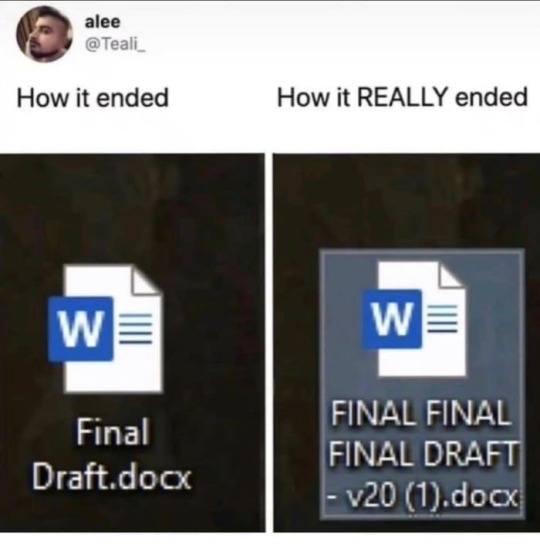
#college#college life#student#study#studying#university#student life#study space#study hard#exam stress#my wriitng#writer problems#essay writing#writers on tumblr#writing#final exams#funny jokes#funny pics#funny videos
489 notes
·
View notes
Text
I just met a dude who wrote a 1200-word essay about the internet’s contortion of Garfield, showed it to me and told me it got a B+. I aspire to be as brave as him one day
442 notes
·
View notes
Text
yes im still talking about abigail but i just cant wrap my head around how some people call her evil and manipulative.
she had to experience both of her parents and her best friend being slaughtered in front of her, then the whole world turns against her, successfully ripping apart any support systems she couldve had at such a pivotal time in her life. when she looks at hannibal like that, when she clings onto him, thats real.
HE is the one manipulating HER, actually. he saw her vulnerable at this time, clearly in need of a father figure with fucked up daddy issues and swooped right in. she was just a pawn to sacrifice to get will closer to him.
alana notes that she comes off as manipulative after the accident because of the way she chooses to withhold information. i think here, alana is expecting too much of her. shes expecting her to immediately be open to pouring her heart out to these strangers shes never met. if theres anything abigail has learned in her life its that the adults around her are not to be trusted. she casts a skeptical gaze over the gifts alana bought her, too, as if confused as to why a someone would choose to be so kind with seemingly nothing to gain.
ive seen people point out her expressions and mannerisms, and to that i say your honour my client is literally just a girl. she is the exact same in her nightmares, hallucinations, and alone, when theres no one to manipulate. she is genuinely afraid, cautious and heavily traumatised
im still rewatching s1 so i might add more if i rediscover some more scenes but yeah :p
abigail haters dni unless u wanna brawl!!!!!!
#hannibal#nbc hannibal#abigail hobbs#will graham#hannigram#hannibal lecter#hannibal nbc#murder husbands#garret jacob hobbs#alana bloom#writing#essay writing#character analysis#media analysis#im hyperfixating again#mads mikkelsen#hugh dancy
166 notes
·
View notes
Text
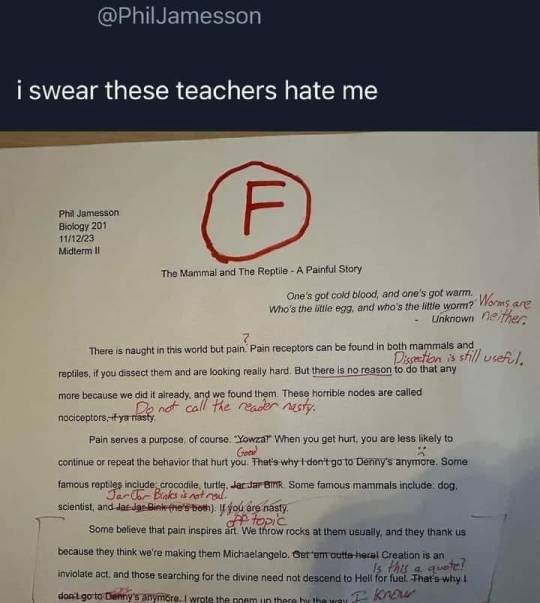
This teacher has no sense of humor or appreciation for creative writing. An F seems harsh, unless this was supposed to be technical writing. I'd like to read the rest of it.
291 notes
·
View notes
Text
The Anti-Bojack: Anti-Intellectualism and the Death of Substance
In the blog essay “Staging Philosophy: the relationship between philosophy and drama”, Kristen Gjesdal opines on the home of philosophy. Many today would consider philosophy a relic of a bygone era with names such as Keikegaard, Voltaire, and Neitzsche. Many don’t know, however, of the close relationship philosophy has always held with the arts. Gjesdal mentions Ibsen in the article, discussing how many playwrights of the time were avid students of philosophy and how many philosophers regarded the arts highly. Nietzsche spoke of social leaders, specifically the religious leaders of his day in Beyond Good and Evil when he wrote, “Men, not great enough, nor hard enough, to be entitled as artists to take part in fashioning man.” Frankly denouncing the power and influence held by the religious men which he felt was more appropriately left in the hands of artists. In fact, Nietzche considered art the definition of culture and hence why he says that artists are the ones who should be responsible for shaping society and defining what it means to be “man”. As such, the expressions of art, poetry to cinema, is a definition of man and inherently a philosophy.
Bojack Horseman is an openly philosophical series that plays with existentialist schools of thought. Having liked several tweets endorsing the comparison of her work to that of Raphael Bob-Waksberg, Vivienne Medrano demands her work be valued the same way. From being favorably compared to Bojack Horseman to being praised as the “Anti-Bojack”. Which begs to question, what does that even mean? First let’s discuss the Philosophy behind Bojack Horseman, then compare the tweets Medrano liked and her series to that of Bojack directly, and then study the overlapping themes and why Medrano’s style of writing makes her storytelling a mockery to the art.
Existentialism in particular has been the darling of the theater for about the last 150 years, though generally ridiculed by “proper” society. For a philosopher to be labeled a nihilist or existentialist was often a denouncement of their school of thought, often for their general rejection of fundamental social structures like ethics. In 1942, writer Albert Camus published his essay The Myth of Sisyphus, rebranding traditional existentialist concepts as Absurd philosophy.
Camus begins his work poised with the question of suicide and whether life is worth living at all. He argues that life is inherently meaningless, an idea originating with Kierkegaard, but while the latter sided with finding purpose in constitutions like religion, Camus argues that religion itself is a philosophical suicide. In the Routledge encyclopedia of philosophy by Charles Guignon, he writes of the criticisms levied against existential and absurdist philosophies in a society awash in moralist anti-intellectualism. He opens this section by saying, “Existentialism has been criticized from a number of different angles. One line of criticism holds that the emphasis on individual freedom and the rejection of absolutes in existentialism tends to undermine ethics; by suggesting that everyday life is ‘absurd’ and by denying the existence of fixed, binding principles for evaluating our actions, existentialists promote an ‘anything-goes’ view of freedom that exacerbates the nihilism already present in contemporary life.” Which comes from this negative misreading of nihilism.
In their video Nihilism: Are We Missing the Point, youtuber Michael Burns of Wisecrack tells an anecdote of his time in grad school where he paraphrases his professor as saying, “This idea of the constant misreadings of Nietzsche’s writings on Nihilism leads to, his words, angry seventeen-year-old atheists.” Which tends to be the issue when discussing concepts such as nihilism, existentialism and absurdist philosophy. Nietzsche, the credited father of the school of thought, is often taken out of context or his views distorted by society’s sensibilities. For one, the quote given earlier extends further into a condemnation of religion by saying, “Such men, with their "equality before God," have hitherto swayed the destiny of Europe; until at last a dwarfed, almost ludicrous species has been produced, a gregarious animal, something obliging, sickly, mediocre, the European of the present day.” Which many an angry seventeen-year-old and moralist has seen as an endorsement of the might-is-right philosophy that nihilism is credited with.
To a lesser extent, Camus writes in The Myth, “I must say what counts is not the best living, but the most living”. It feels like it should be rather straightforward then, the concept of the thought. More equals better, and Camus practically says as much when he later writes “Why should it be essential to love rarely in order to love much?” However, if one follows the first quote to its natural conclusion, he continues, “The most living; in the broadest sense, that rule means nothing. It calls for definition.” His wording may come off confusing as the essay is translated and the theories involved are dense, but Camus clarifies that “most” could mean the sheer number of experiences or the depth of the experience. He is not saying one or the other is the correct answer, but that both are equally valid ways to live one’s life. The focus, then, is not on directing anyone how they should live, but in the manner they should do so. He says, “It is not up to me to wonder if this is vulgar or revolting, elegant or deplorable … Suppose that living in this way were not honorable, then true propriety would command me to be dishonorable.”
Camus, and even Nietzsche, argue that truth is the only ultimate value. It throws back the moralist dilemma by arguing that living to a code of ethics or values when one is not truly that sort of person is to live reprehensibly. Better is it to live authentically “without appeal” as Camus says, than it is to live the lie of following the rules.
Thomas Polzler from the University of Graz in Austria wrote a 2014 article titled “Absurdism as Self-Help: Resolving an Essential Inconsistency with Camus’s Early Philosophy”. Personally, I fundamentally and adamantly disagree with his assessment that there is any sort of inconsistency in Camus’s writings. Camus’s books of The Stranger, The Plague, and The Fall are not inherently inconsistent, but depict his philosophy in layers.
Like water painting, Camus starts with a thin veneer of color, a loose and almost detached protagonist in Meursault from The Stranger. He is a man aware of the absurd as an individual, the story maintaining the focus of a man living aware his life means nothing and thus seems to have an almost neurodivergent disinterested in the world beyond himself. What he feels in the moment is all that matters, so when he commits murder out of feeling uncomfortable from the heat of the sun and the painful blinding of the light, he is then juxtaposed with the ethical society he exists simultaneously within and outside of. Meursault is held up as a sociopath for not wishing to see his mother’s body the night before her funeral and smoking by her coffin. Because he does not cry at her passing, he is deemed a danger to society. Because he goes on a date to a comedy picture the day after, he is denounced as a menace. None of which has anything to do with the man he killed. The trial highlights the absurdity of ethical society and how the moralists demand the appearance of values over actually having them.
In fact, the trial of Meursault closely resembles that of Bojack and Sarah Lynn. The end of season 3, Bojack and Sarah Lynn go on a cross-country drug-fuelled bender to apologize to people Bojack has hurt in the past, stopping at the Griffith Observatory where Bojack has a profound revelation. He talks about living in the moment and how neither the past or future really matters at all. What you did and your legacy don’t matter if you cannot exist now. It is this moment that he realizes Sarah Lynn is not responding. It isn't until season 6 that it is shown that Bojack waited before calling the police and thus played a hand in Sarah Lynn's death. He is taken to civil court by Sarah Lynn's mother and step-father and made to pay them a fine for his involvement. However, is it really justice when Sarah Lynn's mother exploited her in the business and never once supported Sarah Lynn for what she wanted and what her dreams were, or even just who she was? Can one argue that it is justice when Sarah Lynn was sexually abused by her step-father throughout her childhood? Yes, Bojack does have responsibility in Sarah Lynn's death, but so do her parents. The absurdity of it all being that in no way could there ever be justice for Sarah Lynn.
Brief mental health sidebar. While I have to expressly disagree with Polzler’s reasoning, I do agree with his conclusion. Philosophy and especially Absurd existentialism are powerful tools in the journey to self improvement. It is both the line from Bojack where Diane says "That's the thing. I don't think I believe in 'deep down'. I kind of think all you are is just the things that you do." And Dr. Wong in Rick and Morty when she says, “You seem to alternate between viewing your own mind as an unstoppable force and as an inescapable curse. And I think it is because the only truly unapproachable concept for you is that it's your mind within your control … You are the master of your universe.”
It may be shocking to know that Medrano was not a fan of Dr. Wong, considering the scene all about telling and not showing Rick’s problems. However, this is after two and a half seasons of witnessing Rick’s shortcomings and Dr. Wong is not telling Rick’s problems, but rather identifying the solution. In both the words of Diane and Dr. Wong, who we are, comes down to the choices we make. There is no moral argument being made with either of these comments. Bojack asked Diane to tell him that he’s actually a good person deep down. That he means to be good, that despite his actions he doesn’t want to hurt anyone and that his bad behavior is the fault of his emotionally unavailable and narcissistic parents. So really, he isn’t a bad person. Whereas Dr. Wong calls out Rick’s behavior as a choice because Rick knows he is making these choices.
The difference between Rick and Bojack is the level of personal awareness and responsibility. Rick knows he has the power to change, but simultaneously so miserable but is so afraid of change that he turns himself into a literal pickle and risks his own death over confronting his own choice to stay the way he is. It is easier for him to justify his lack of trying by simply claiming this is just what it means to be as smart as he is. Whereas Bojack feels helpless. Bojack was not set up for success as a child, his success was never validated by his mother and thus he never valued himself, and every time he tries to change he has no internal fortitude to keep from backsliding at the first sign of defeat. Rick knows everything that is making him miserable is himself. Bojack externalizes his misery and thus also externalizes the solution to his problems, which is why he lets himself return to square one whenever things don’t go his way.
Absurdism is the recognition that life is meaningless and thus we have two choices: Live or die. But these concepts are not so straightforward when discussed. To live, in Camus’s philosophy, is to live authentically to oneself. That may sound like Rick’s situation of accepting things as they are, but that is only true in the case of the individual genuinely wanting to be that way. Authenticity is a dichotomy consisting of both how we behave and how we feel. In the case of Rick he lies, cheats, manipulates, and behaves cruelly towards his family. However, it is implied and later revealed that Rick genuinely cares about his family, but is too afraid of experiencing loss to really let them in. So he’s abusive and insulting, keeping his family at an emotional distance that keeps them around, but never too close, making Rick miserable. He really wants his family, so his feelings are at odds with his behavior. So in reality, him claiming “this is just how things are/who I am” is just as weak an excuse and removes agency over oneself as Bojack saying “It’s because my mother was never there for me.”
The actions both Rick and Bojack partake in are what Camus would call a philosophical suicide. Concisely put, to commit a philosophical suicide is to remove one’s sense of agency in their own life. How can one claim to be living when they have no effect on anything including themselves? You would exist in a void no different than a dreamless sleep. Your actions are meaningless, your thoughts are meaningless, your feelings are meaningless because you are a passenger to the act of living. Everything else has power, everyone else can influence you, so you may as well be nothing. Camus includes religion in this section of his philosophy, as living for something other than yourself is the same as not living at all. And this encompasses Ethics.
There is a massive difference between being kind because you are supposed to, and being kind because you want to. This delves further into living inauthentically and how that mere act alone results in misery. Even if one is to behave in a way deemed “right” without making the choice, they will inevitably become resentful. There is no such thing as faking it until you make it. One has to actively choose and change themselves on a fundamental level to find happiness, and that takes work. Just as Dr. Wong says, “It’s just work. And the bottom line is some people are okay going to work and some people, well some people would rather die.”
Which gets to the main point.
Medrano’s liking of a series of tweets calling Blitzo the Anti-Bojack has both infuriated and confused me. I suppose that I should be embarrassed at the latter since it's obvious both Vivienne and her fans lack basic media literacy. It’s actually rather spectacular just how badly they misrepresent the situation of the characters in the narrative. I can only break this down comment by comment.
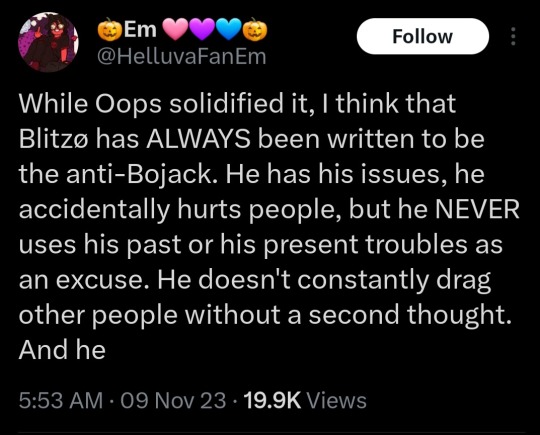
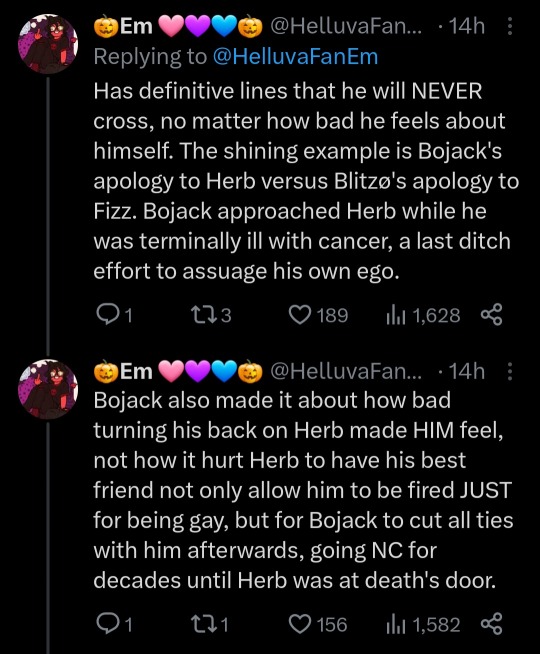
For one, Bojack’s entire character is that he doesn’t intentionally hurt others. He has his reasons that fundamentally comes from a weak sense of self associated with a child who never had the emotional support he needed growing up. Those aren’t excuses, those are the reasons. Bojack has an unhealed inner child who wants to be a good guy, but he is so caught up in his self-loathing and resentment that he doesn’t do anything about that inner child. Instead he indulges these immature emotions through self medicating with drugs and alcohol, lashing out, promiscuity, and careless spending. These are the symptoms of the problem, the problem does lie in past trauma. The issue is Bojack doesn’t see the solution as himself, but someone or something else. In my post comparing Bojack and Todd’s relationship to Blitz and Moxxie, I pointed out how Bojack and Blitz treat their “closest friends” exactly the same by verbally abusing them and tearing down their abilities. While not always consciously intentional for Bojack, it is to keep Todd feeling codependent on Bojack and thus never leaving him which is abusive and manipulative. For Blitz, the narrative says it's because he is aware of his behaviour and is intentionally pushing Moxxie to be better, which is abusive and manipulative.
My point herein being that these are the same people. There is no Anti-Bojack happening here. If anything, Blitz is more malicious in his abuse seeing as he appears actively aware and intentional in how he mistreats Moxxie. Bojack is abusive towards Todd, but in a way that is a reflection of Bojack. And the series acknowledges how Bojack's inability to be alone actively harms his other relationships. Not just Todd.
In one way, however, Blitz absolutely is the Anti-Bojack. Blitz externalizes the source of his behavior to a character failing on Moxxie's part. And the series reaffirms and justifies Blitz's abuse as okay.
The other misconception of this post is thinking that an explanation is an excuse. Creative Screenwriting did an interview in 2019 with Raphael Bob-Waksberg’s process and philosophy of writing Bojack Horseman, quoting him for the title of the article, “Characters should be understandable in their vulnerabilities.” What Medrano’s fans fail to do, fundamentally, is understand. Their opinions and twitter orations are so barren of understanding that one must ask if they simply choose to ignore what does not serve their narrative or if they really are just incapable of comprehension.
They see Blitz’s mother’s death as a reason for his attitude more than his behavior. His behavior then necessitates that it needs to be excusable. As such, Blitz cannot actually make mistakes. Things happen by chance rather than a deliberate choice on any of the characters’ behalf. The fire in Oops wasn’t a mistake made by Blitz, if it is anyone’s mistake, it is the no-named imp who lit the candle before getting to the room. Blitz didn’t intend to bump the other performer, he just happened to turn at that moment. His mistake, then, is one that only makes sense on a metanarrative aspect. His mistake was deciding not to confess his feelings to Fizz. Which… no. As novel as the concept of the butterfly effect was in 2015, the fundamental nature of something inconsequential being attributed to a disaster negates blame. No one is going to blame the butterfly for a hurricane. Similarly, Blitz’s decision to not confess has nothing to do with the fire, in fact the fire itself is not even his accident. His contribution begins and ends with accidentally bumping the other imp; a situation that would have been entirely harmless if not for another character’s unrelated decision made off-screen.
Additionally, Blitz is a heinously insufferable individual who has been nothing but insulting and abusive to his “friend” throughout the series. He sexually abuses Moxxie in Harvest Moon by touching his penis against his will. He threatens to rape Moxxie and Millie in Murder Family. Blitz humiliates Moxxie through emasculation by masculinizing Millie over Moxxie, mocking Moxxie’s anatomy through his weight and genital size, and degrading Moxxie’s hobbies and abilities. Often without any prompting whatsoever and for Blitz’s own personal enjoyment. Blitz simply is a malicious individual, and at one point the series seemed to know that. The issue isn’t that Blitz is an awful person, it’s the lack of acknowledging that fact. The fans and Medrano conveniently ignore who this character is and what he has done to justify him instead of seeking to understand him. This is a running theme throughout the show.
I also briefly compared the scene in Oops to Herb and Bojack in this post, but I didn’t focus so much on the characters and more the metanarrative reason why Bojack worked and Helluva Boss didn’t.
Here, let’s look at why Bojack went to see Herb: Because Herb told him to. Unlike the scenario between Fizz and Blitz where they didn’t see each other for fifteen years and then conveniently run into each other and just so happen to be spotted by Crimson and Striker who, for some reason, know all about Fizz and Ozzie being a thing and they just keep Blitz around because … he’s the main character. Sure, one could argue both Crimson and Striker have a personal thing against Blitz, makes you wonder why they didn’t, you know, do anything to him? No torture or revenge of any kind, he’s just there now. Conveniently tied up and kept with Fizz instead of literally anything else they could have done with him. There is no internal logic to the characters as to why things turn out this way. As seen in the Mammon episode, it's a metanarrative compulsion to make sure Blitz is in every episode regardless of whether it makes sense or goes anywhere, or not.
Another sidebar, but the fact that so much of the series is not able to be explained within the narrative and requires an understanding of how Medrano and her team formulate a script is a huge issue. It removes the ability to properly dissect the characters as individual people and necessitates a reading of them that is how Medrano wants the audience to think about them. When it comes to the character dissections, it is effectively impossible to have a complete or coherent reading in regards to the literary philosophy of the Death of the Author. You have no story or character if you remove Medrano. The world as a whole completely falls apart unless you inject it with her metacommentary and narrative intention like one would preserve a corpse through glycerin. There is absolutely no substance here. And the longer she goes on, trying to compile the whole show into a coherent narrative of its own is like building a skeleton with a human ribcage, an ostrich spine, an elephant skull and the lower half of a barbie doll.
Bojack calls Herb after finding out he is dying from cancer, Herb tells Bojack to come visit him. He refuses to talk to Bojack any other way, and Bojack is compelled to go by his guilt, not ego. Herb calling him to his house obliterates Bojack’s ego, this is Herb’s home and he is the one being summoned. This is where Herb has the most power compared to, say, over the phone. This is not only a move of superiority on Herb’s part, but an act of submission on Bojack’s. Herb forces Bojack to come to him. Once again, this is what power dynamics look like. But, despite the resentment and awkward bitterness, he does want to see Bojack.
I don’t know how many times I can articulate this. Herb is the one in control and he is the one who wants to see Bojack and he is the one calling the shots. Not at all comparable to Fizz being kidnapped, forced to interact with Blitz and then wholly reliant on him due to the narrative in order to facilitate this forced reconciliation. Herb and Bojack are people with complex feelings and agendas. Blitz and Fizz are two dolls being smashed together and held in place by the will of a childish god.
Second, the reason Bojack calls Herb is because he feels guilty, not for abandoning Herb but because he betrayed Herb. He told Herb he would stand with him and walk off the show if they tried to fire his friend, but according to Bojack, he was a coward and didn’t keep his word. He feels guilt for that, he regrets it. But when he apologizes to Herb for it, Herb corrects him. It isn’t because Bojack didn’t keep his word, like the horse man thought, it was because he thought the betrayal was more important than their friendship.
He’s a coward, but not for staying on Horsing Around. He’s a coward because he didn’t believe in their friendship. They were together for years and Herb thought that meant something, but Bojack avoiding Herb and never reaching out to him showed how little their friendship meant to him. And it wasn’t because Bojack didn’t care, Herb knows that. And that fact is necessary to understanding the sequence. Bojack didn’t value the friendship because he thought he was valueless. He avoided Herb because he thought Herb would never forgive him, because that is how little Bojack thinks of himself. Him calling Herb is the active display of him still not forgiving himself, so he needs Herb to do it for him. And Herb knows all of this.
“You know what your problem is? You wanna think of yourself as the good guy. Well, I know you better than anyone else and I can tell you that you're not. In fact, you'd probably sleep a lot better at night if you just admitted to yourself that you're a selfish goddamn coward, who takes whatever he wants, and doesn't give a shit about who he hurts. That's you. That's BoJack Horseman."
Bojack has no value in himself, leaving him extremely fragile. So he took what he wanted, he took their relationship and defined it for both of them. He ran away, protecting himself while determining that this is what Herb would want, and left Herb alone and powerless even in his closest friendship. Which is why Herb demands Bojack come to see him, it’s Herb reclaiming his power in the relationship. And all of this only has any meaning if you clearly define the fact that Bojack apologized for the wrong thing.
There’s an alternate universe where Bojack doesn’t go back and apologize at all, and he and Herb rebuild their friendship anew in Herb’s last days and they simply, quietly agree to start over. Because that’s not off the table. Herb still values the telescope. He still values their friendship. Bojack, once again, takes it away. And Herb, a dying man, fights viciously to keep hold of it. Him not forgiving Bojack is not wanting his friend back, if anything, it’s because he desperately wants Bojack back that he won’t forgive him.
The telescope isn’t just a metaphor when it breaks. It's the symbol of their friendship the entire time, and the physical actions taking place over it are a screenshot of what happened. Bojack took their friendship and left with it. But it meant something to Herb, and you would only know that by how he fights over it now. And when it breaks it shows that, because of Bojack and his cowardly need to run away from his problems, their relationship is now, finally, beyond repair. Not because Herb didn’t forgive him. It wasn’t over when Herb didn’t forgive him. Bojack ended it, not Herb.
But just like Bojack, Medrano and her fans believe that forgiveness is the end all of the story. It’s why so many people were not invested in Fizzarolli and Blitz makeup. Because Fizz just forgiving Blitz makes everything they went through meaningless. It strips the characters and what they went through of depth and nuance in a single moment. It also validates Bojack's general mindset in the belief that one moment can fix a systemic problem. In this case, Medrano isn't the Anti-Bojack, she just is Bojack.
The issue between Herb and Bojack wasn’t the job, or even the time. It was Bojack. And it is the failure of Bojack identifying the part of himself that resulted in this outcome, and not making the choice to do anything different that results in the end of everything. Maybe Herb would never have forgiven the Bojack who left him. But that’s why Bojack needed to be a different Bojack. And he wasn’t.
Wrapping this back around to the start of the essay and how Absurdist philosophy plays into Bojack intrinsically, Herb says exactly that truth to Bojack. That if Bojack was only honest to himself and lived authentically, maybe he would be able to sleep at night. Because being good is less important than being real.
This reminds me of Jean Baptiste Clamence from Camus’s The Fall. A Frenchman in the seedy center of Amsterdam, a city encircled by canals like the rings of hell. He spends his nights in the bar just outside of the red light district, drunk off his ass, it is uncertain if he is actually telling his story to anyone at all. Over the course of four nights, he tells his story of his fall from grace. His self exile to Hell after being unable to cope with his guilt. He tells so many stories of himself, egotistically claiming he has the lost panel of the Ghent Alterpiece in his apartment, the piece titled The Just Judges.
Even his name is a plea for repentance. John. Baptist. Clemency. He claims to sleep with Judges looming over him. Words endlessly flow from him and he confesses his sins.
It’s when he fesses to witnessing the suicide of a young woman in Paris that he explains why he ran away to Netherlands. He says how she called for help after jumping into the water, but he quickly fled the scene, hearing the splashing below become eerily silent. One could argue that he couldn’t do anything. In the Paris winter, the freezing water of the canal could kill them both, let alone the dangers of trying to save someone who is drowning. The main concern being the victim drowning their savior in a frenzied panic of keeping themselves above the water. It could be said that he did the only thing he could. However, he knows she was aware he was there, so she called out to him specifically when she came to her senses. No one witnessed the incident or knew he was there but her, and no one could fault him for doing nothing.
But he feels the guilt in himself, and thus runs away.
Jean-Baptiste, Bojack and even Diane all have the same mentality. They fetishize their misery and trauma, making themselves important through the loops of suffering they inflict on themselves. Thinking that because the events happened to them, it must mean they are somehow special. That their damage meant something out of all the other people on this planet who suffer. That because they felt alone and responsible, they are a mythical chosen one selected from the masses to do something. They find value in the negative self-image they have, their pain being their purpose.
Because if it didn’t matter, why did it happen to them?
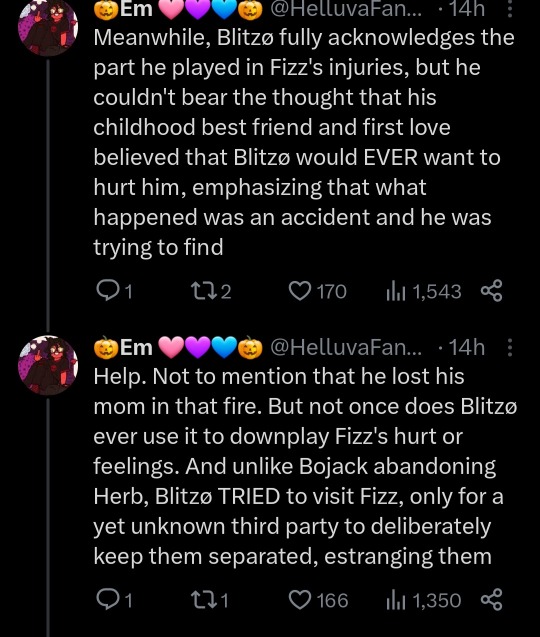
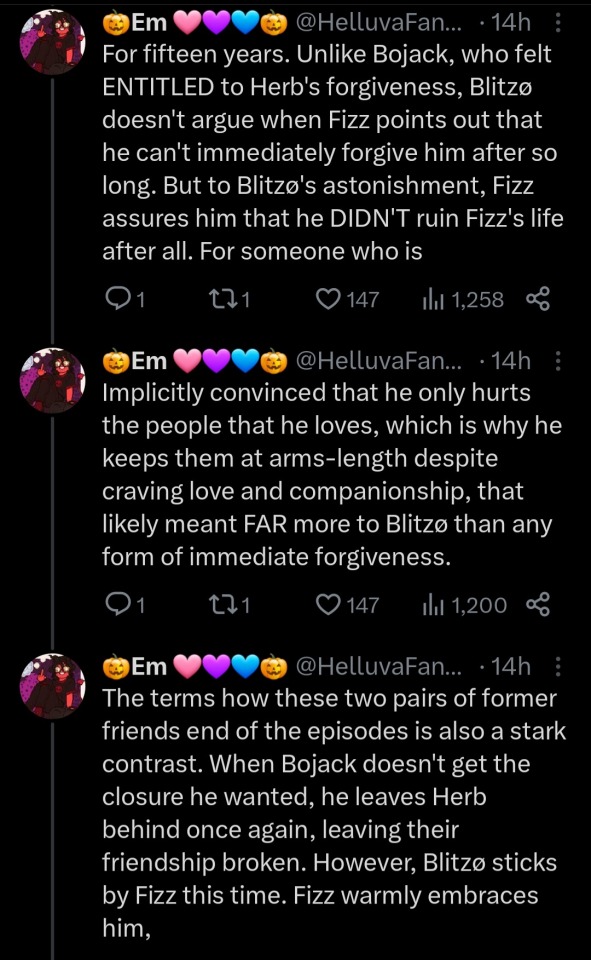
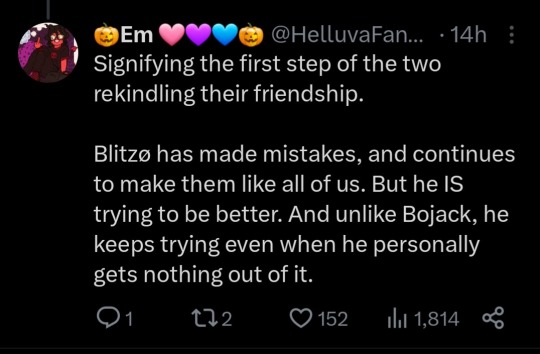
This is where I normally would keep just ripping apart the arguments, but frankly, there isn’t one anymore. For one, the original poster just blatantly lacks any fundamental understanding of Bojack as a series since the entire premise of the show is every season Bojack tries to change.
On a narrative basis, the lack of intentionality on Blitz’s part absolves him from needing forgiveness. Fizzarolli forgiving him holds no weight because Blitz didn’t intentionally set the fire, he didn’t see Fizz in the explosion when he ran away, he didn’t not try to see Fizz in the hospital and then Medrano puts the cherry on top about how Fizz’s life is actually better because of everything that happened. It’s equal parts boring and vile. The conflict is artificial, the resolution is repulsive and contrived. There is no depth to these characters and Medrano actively removes depth, either because she herself lacks the ability to comprehend it or because she knows her fans are incapable of doing so.
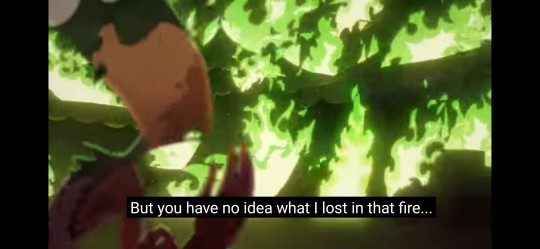
Also, let's just not comment on how this line explicitly overshadows Fizz's trauma. Everyone knows you don't end an apology with "but". That negates the whole apology. This is literally "I'm sorry you got hurt and I can never make that up to you, BUT my mom's dead so you don't even know what it's like being me and feeling responsible for that."
While the writers of Bojack sought to make their characters understandable and thus empathetic, they at no point excused or retconned the behavior. The writers on Bojack didn’t do anything to justify their characters, they were not at all focused on controlling how the audience felt about the characters. They were showing that the characters were well rounded, had reasons, why they had those reasons, what core memories made them who they are today. And the audience had the choice in how they responded to the characters. Medrano needs her audience to feel the same way about her characters as she does in order for the story to work, because she has never put forth the effort of actually telling this story.
One does not need the interviews with Bob-Waksberg to understand his cast and their story. Everything a viewer needs to know can be found in the show proper. There are not huge points of context happening just over there, off screen, between episodes and relegated to background details. Everything relevant to these characters and their stories is in the show. That has not and at this point never will be the case for Helluva Boss. So in many ways, yes. Helluva Boss is the anti-Bojack.
That's not a good thing.
#tw sa mention#philosophy#bojack horseman#bojack horseman spoilers#helluva boss critical#helluva boss critique#helluva boss criticism#vivienne medrano#vivziepop#vivziepop critical#spindlehorse critical#spindlehorse criticism#vivziepop criticism#long post#lots of repetition in places#i get philosophy is dense#its sometimes hard to grasp#especially for this fandom#sources#helluva long post#writing critique#critical thinking#essay writing
187 notes
·
View notes
Text
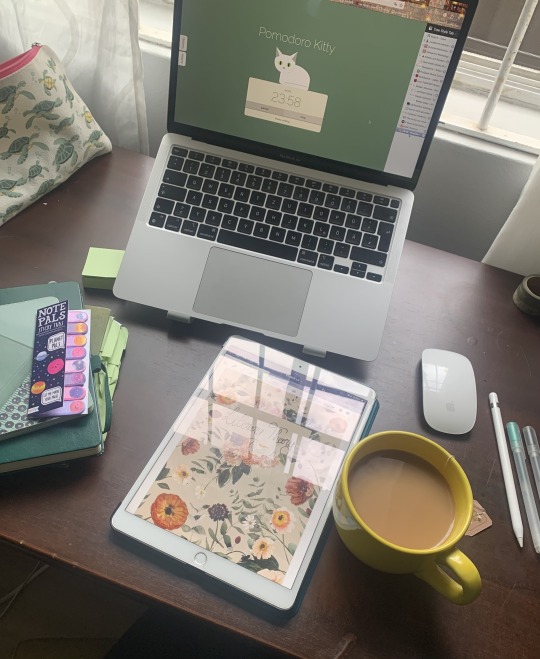
save me pomodoro kitty
#my only hope#essay writing#pomodoro#productivity#aesthetic#dark acadamia aesthetic#light academia#romantic academia#dark academia vibes#grey academia#english literature#time management#studyblr#study aesthetic#study motivation#studying#study blog#studyspo#dark academia#chaotic academia#pomodoro kitty
164 notes
·
View notes
Text
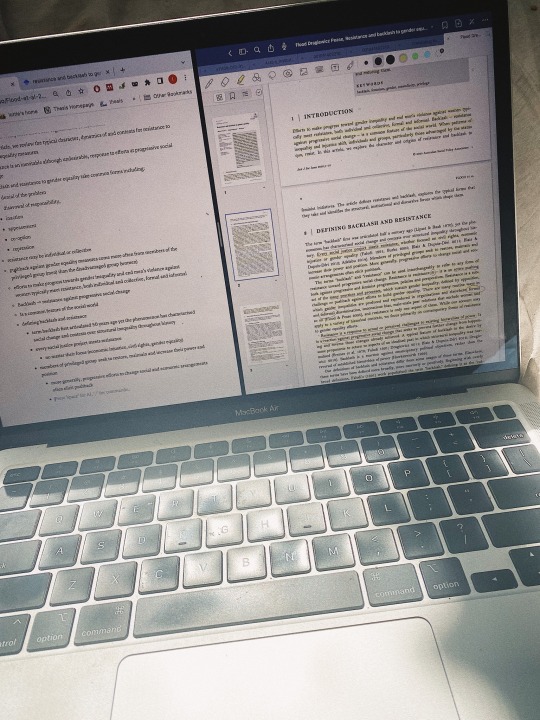

17.07.2023—brb birthing a thesis. currently in a love/hate relationship with the literature review (it’s mostly hate)
#studyblr#studyspo#study notes#bullet journal#study motivation#study blog#athenastudying#stationery#studying#study#thesis#gradblr#thesis writing#essay writing#polisci#heydilli#heygutlcss#heycoral#hey calamity#heykenzie#heyzainab#heychenleyah#heyblake#heyzo#lookdivo#lookstudyblr#aesthetic#study vibes#studysthetic#dissertation
290 notes
·
View notes
Text
physical touch in slam dunk
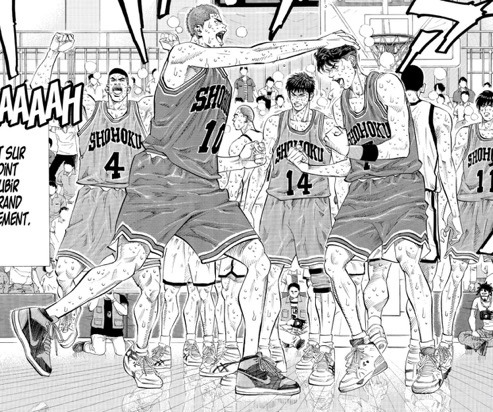
There is a big difference between the dynamics of friendships involving two girls, compared to a friendship with two boys. Girls are more likely to be communicative with how they appreciate each other. Boys don’t communicate this verbally, due to not wanting to come off as “cheesy” or “corny”. Instead, they show their affection/appreciation towards each other through physical touch. While not all guys are like this, a lot of boys are very touchy with each other, even coming off as gay at times.
Slam Dunk presents an accurate portrayal of male friendships. Their relationships with each other reflects on their age and maturity, and I believe it is part of why Shohoku and their dynamic as a team is so likable.
Something that I believe is notable is that the boys aren’t emotionally vulnerable with each other. Both Ryota Miyagi and Hanamichi Sakuragi are shown to have rough backgrounds, but neither of them are shown to tell their teammates about it. And they aren’t visibly depressed in front of the team.
I think the most emotionally vulnerable moments are from Mitsui and Akagi, who are both the oldest of the team.
Mitsui, who had hid his feelings of wanting to go back to basketball, finally broke down when Anzai walked back into the gym. Mitsui clearly did not intend to break down like this, I think he was just caught in the moment. The guys didn’t say anything about this, partially because they were still pissed at Mitsui for what happened, but also because they probably wouldn’t have known how to handle that at the moment.
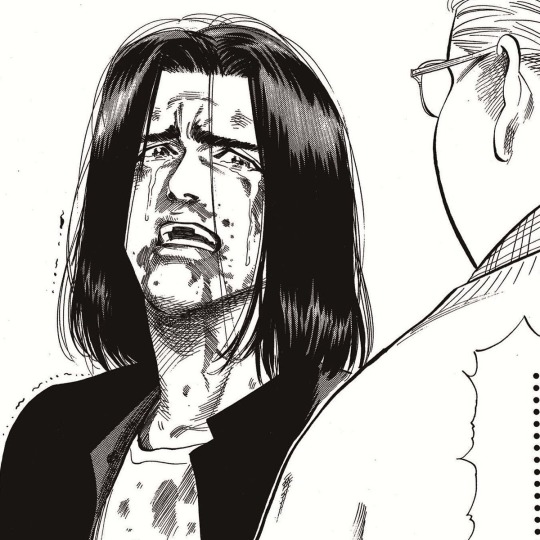
The moment in the series to me that signified the most about how the boys aren’t vulnerable to each other was when Akagi cried, and said that the team was amazing. The guys didn’t comfort him, but instead were like “Why you crying?” and then went on to make fun of him. I think this is realistic compared to other series where the guys are all comforting each other, as they are teen boys and they don’t want to come off as soft.
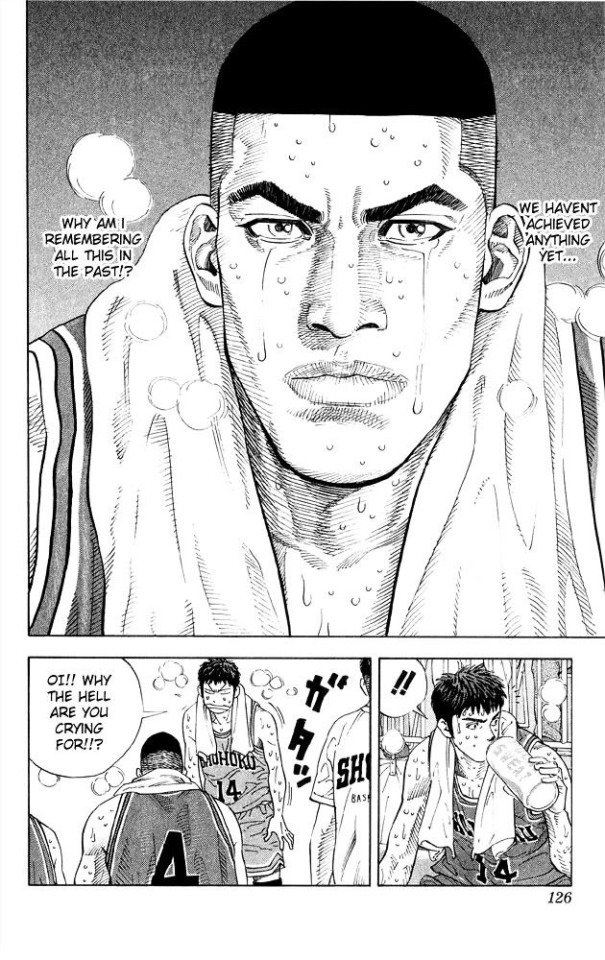

Another vulnerable moment in the series was when Miyagi and Sakuragi both cried in front of each other because of their bad luck with girls. This wasn’t intentional either, and I think it was the result of the heat of the moment.

Instead of being affectionate through words, physical touch is used to show the boys’ friendliness with each other.
An example of this is during their games. When the team scores, they high five each other, fist bump, or pat each other. While this is typical behavior for teams, it is used to show Rukawa growing closer to the team, as he ends up engaging in this as well.
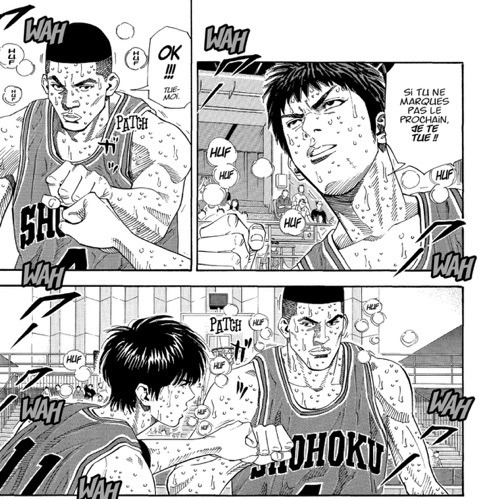
Additionally, when Shohoku lost against Kainan, Sakuragi cried. Akagi doesn’t say anything to comfort him in particular, but he pats Sakuragi and walks with him. I think this showed his care for Sakuragi, and he felt bad seeing him like that, it just wasn’t portrayed with words.
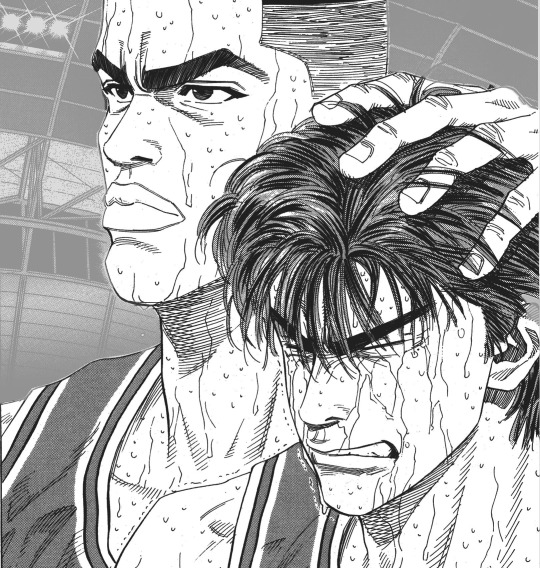
And when Akagi cried after winning against Ryonan, Sakuragi wraps his arm around Akagi and tells him to come line up with him. Again, nothing particularly comforting is said verbally, but it’s shown through actions.

Another big moment, arguably one of the biggest in the series, was Sakuragi and Rukawa going up to each other and high fiving after winning against Sannoh. Rukawa is shown before this to have high fived or fist bumped other members of the team, but not Sakuragi. Due to their “rivalry”, the two didn’t say anything and just looked at each other for a second before turning away. However, their high five signified how the two had grown close, as teammates and as friends.
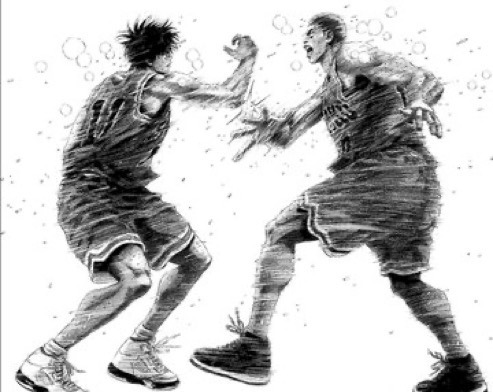
Showing emotional vulnerability and closeness through physical touch is very effective and provides a sense of realism, and I believe that Slam Dunk would not have been as strong of a series if the physical touch between the team was not presented.
#slam dunk#スラムダンク#headcanon#slam dunk anime#anime and manga#blog#hanamichi#sakuragi hanamichi#hisashi mitsui#takenori#takenori akagi#rukawa#kaede rukawa#miyagi ryota#ryota miyagi#character essay#character analysis#essay writing#shohoku#inoue
509 notes
·
View notes